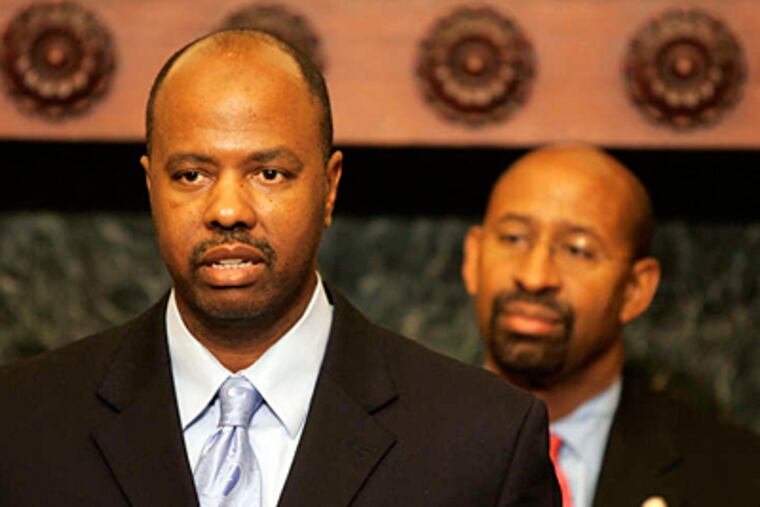Are new property-tax reassessments illegal?
BACK IN early 2010, city homeowners were relieved when Mayor Nutter announced that he would halt new property assessments until the city had time to fix its fouled-up property-tax system.

BACK IN early 2010, city homeowners were relieved when Mayor Nutter announced that he would halt new property assessments until the city had time to fix its fouled-up property-tax system.
But some residents are getting hit with higher tax bills this year anyway - and they're not happy about it.
"We would have never have bought this house if we thought the taxes would be $9,000," said Anne Donovan, whose tax bill on her Fairmount property, which contains three apartments, tripled this year. "The standard in this neighborhood is somewhere in the threes. Who the hell is going to buy a house that [has] triple [the taxes of] the rest of the neighborhood?"
Donovan, like many of those getting new assessment notices, did renovation work on her house last year. When Nutter announced the reassessment moratorium in May 2010, he warned that there would be some exceptions for new construction and renovations.
Still, homeowners like Donovan say that they are being unfairly targeted, given that others who have done renovations over the years may never have seen increases under a system that was hammered in a 2009 Inquirer series as being rife with inequities, loopholes and political cronyism. Since then, the city has taken over assessments, leaving the old Board of Revision of Taxes only with the power to hear and decide on assessment appeals.
The Nutter administration says that it is properly raising taxes on people who have done substantial work on their homes.
"Renovation work is something you always pick up," said Chief Assessment Officer Richie McKeithen, who is heading an effort to have a complete set of new assessments by next fall. "If we did ignore the renovation work, we'd be making it worse."
But Donovan's attorney, Kenneth Metzner, said that reassessing a handful of properties for any reason violates state law, which requires that all properties assessments be "uniform."
"The law does not permit the city to target specific groups of property owners for reassessment, when the city is not applying reassessment to all other properties," said Metzner. He is representing a group of homeowners in a suit against the city that argues that the current property-tax system is illegal and that the overhaul is not happening quickly enough.
Brett Mandel, a longtime critic of the city's property-tax system and lead plaintiff in that lawsuit, said that he had heard from about two-dozen people hit with tax increases, mostly due to renovations. Reassessing a select number of homeowners was a violation of state law, he says.
"What you can't do is say, 'We'll have a moratorium for some and not others,' " said Mandel. "That's bad and it helps reinforce the sense that we're not fixing the system, we're sticking it to taxpayers."
McKeithen said that reassessing those who've done renovations or new construction is a standard practice during a moratorium.
"I think the uniformity rules are merely stating the commonsense thing that taxes must be uniform," McKeithen said. "I'm quite confident that our attorneys looked at everything when the moratorium was crafted."
According to the city, reassessment notices were sent to 2,158 homeowners for 2012 taxes - a much smaller number than in previous years. More than half of those were due to renovations, but some were for new construction or other reasons. City officials stressed that anyone unhappy with their assessment can appeal.
Carolyne Dilgard-Clark, a neighbor of Donovan's, said that her bill increased $5,400 after she added a bedroom and bathroom to her home last year. She said that she was stunned by the increase, given that none of her neighbors saw substantial changes.
"To more than double my taxes and not make any other changes to anyone in a few block radius, to me is beyond comprehension," Dilgard-Clark said. "When I first saw this, I assumed it must be a computer error."
Dilgard-Clark, who is working on an appeal, said that she didn't have a problem with paying more in taxes under a fair system. But now she feels that she has an unduly high tax burden that will affect her ability to sell her house.
"When one or two or three houses get singled out, it affects the marketability," she said.
Some people who didn't do renovations got hit with higher bills. A South Philadelphia man who asked to remain anonymous said that taxes on a rental property he owns were doubled after he made some cosmetic changes that he touted in a rental listing.
"I was sick to my stomach," he said. "I would have never bought the property if I thought the taxes would be doubled.
"The whole block gets doubled? Hey, what am I going to do? But me being the only one on the block is ridiculous."